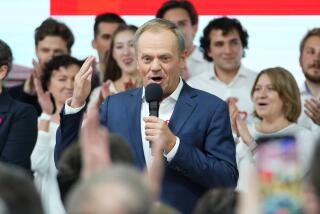Solidarity Urges Boycott of Referendum : Restructuring ‘Propaganda,’ Banned Polish Trade Union Says
- Share via
WARSAW — The banned trade union Solidarity urged Polish voters Monday to boycott the government’s planned referendum on economic and political reform, characterizing its purpose as “solely propaganda.”
In a statement issued by activists in Gdansk, Solidarity charged that the questions, to be put before voters here Nov. 29, are vague and fail to offer to the Polish public any clear idea of what the Communist government has in mind with its plans for “democratization” or restructuring of the nation’s troubled economy.
The Solidarity statement could result in a contest between the government and the underground trade union to see which has more influence over the Polish public.
The government, attempting to find support for economic changes that would result in a series of price increases, has indicated that it plans an extensive campaign to win approval for its reform measures in the referendum.
The government has said that it is seeking a yes vote from 51% of the registered voters. If 25% of those registered sit out the election and as many as 26% vote no, the government could lose. On the other hand, as some opposition analysts have pointed out, no one is sure what steps will be taken to assure that the outcome is accurately counted.
The Polish Parliament, the Sejm, approved the two questions on the referendum Friday. The first asks voters to approve a radical package of economic reforms to improve living conditions, knowing that the plan could bring two to three years of “difficulties.” The second question asks the voters to approve a “Polish model of democratization,” leading to increased citizen participation in government.
Solidarity charged in its communique Monday that the government already has squandered its credibility.
“The country is being governed today by the same team that introduced martial law six years ago, quashing the democratic aspirations of society,” the statement said. “The government at that time solemnly pledged to introduce an economic reform and lead the country out of its crisis. None of these promises has been kept.”
No Real Choice Seen
The union said that it favors economic and political reform but added that the government failed to present Poles with a genuine choice in the referendum.
“As to the question of whether to take part, we must give an unequivocal ‘no.’ Society should not take part in an undertaking of a solely propaganda nature,” the statement said.
The union also announced a reorganization that would feature a new national executive council, with union founder Lech Walesa as chairman. Ten regional Solidarity leaders would also be named to the group.
The move is seen as a response to growing complaints from lower-level activists that the top leadership of the union is losing touch with rank-and-file members in factories around the country.
Solidarity was suspended in December, 1981, when martial law was declared, and outlawed in 1982. The ban has remained in effect, even though martial law was ended in July, 1983. Although most of the union’s activities, including dues collections and clandestine publishing, go on underground, its leading activists are well known and often subject to harassment by the authorities.
In effect, the reorganization unifies the underground leadership with the public “provisional coordinating committee” and is in a sense Solidarity’s response to what may be a liberalizing trend in Poland.
The new era of reform in Poland, if it turns out to be genuine, is something of a test for Solidarity, which does not want to oppose reform and yet cannot afford to be viewed as endorsing the government. For its part, the government portrays Solidarity as an extremist and “suicidal” organization bent on opposing the government no matter what it does.
More to Read
Sign up for Essential California
The most important California stories and recommendations in your inbox every morning.
You may occasionally receive promotional content from the Los Angeles Times.













